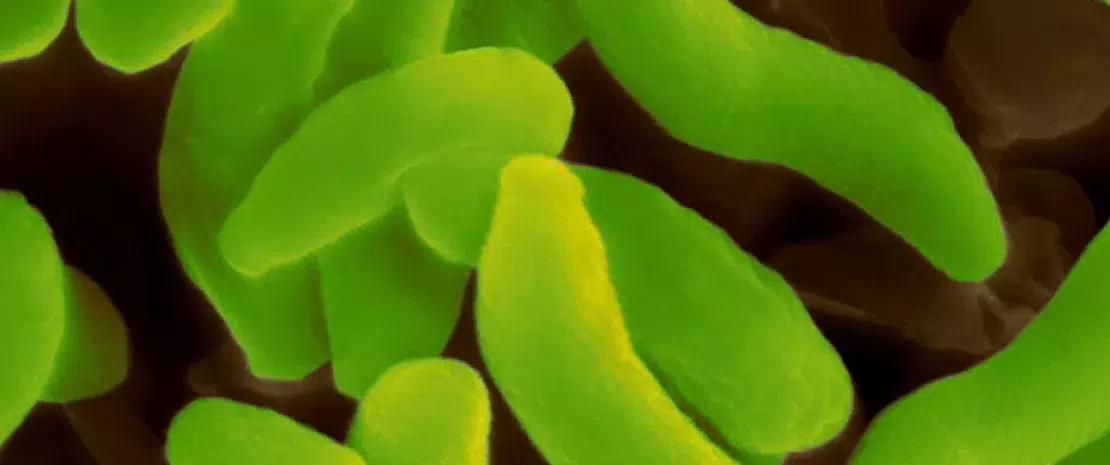Parkinson’s disease: Desulfovibrio bacteria have been found guilty
So suspect scientists. Desulfovibrio bacteria in the gut have recently been accused of inducing aggregates in the digestive system which then spread to the brain via the vagal nerve.
Lay public section
Find here your dedicated section
Sources
This article is based on scientific information

About this article
In Parkinson’s disease, alpha-synuclein (alpha-syn) proteins are found to accumulate, in the form of Lewy bodies, in the brain, as well as in numerous other tissues and organs, including the spinal cord, autonomic nerves, myocardial tissue, and the human digestive tract. Some scientists suspect Desulfovibrio bacteria to be involved in the formation of these gut aggregates, which spread in a
(sidenote:
Prion
Prions are infectious agents composed of proteins and are associated with specific types of neurodegenerative diseases. For example, bovine spongiform encephalopathy (BSE or “mad cow disease”) is a prion disease that affects cattle and whose human variant is Creutzfeldt-Jakob disease (CJD).
Source: https://www.who.int/fr/news-room/fact-sheets/detail/food-safety
)
-like manner to the brain via the vagal nerve. Desulfovibrio appears with greater frequency and abundance in Parkinson’s patients, particularly in severe forms of the disease. Are these bacteria, which are known to produce hydrogen sulfide (H2S), really capable of this? A Finnish study on animals attempted to find out, using a C. elegans nematode model expressing human alpha-syn.
10 patients, 10 spouses and nematodes
Three strains of Desulfovibrio (D. desulfuricans, D. fairfieldensis and D. piger) were isolated from the fecal samples of 10 Parkinson’s patients and their 10 healthy spouses at a clinic in Finland. These bacteria were then used to feed the nematodes. In parallel, other worms were fed Escherichia coli MC4100 that produces curli, an amyloid fiber that facilitates alpha-syn aggregation (positive control). A final group of worms were fed a diet containing E. coli LSR11, which is incapable of producing curli (negative control).
8.5 million Global estimates in 2019 showed over 8.5 million individuals with Parkinson disease.
2x The prevalence of Parkinson disease has doubled in the past 25 years.
329 000 Parkinson disease caused 329 000 deaths, an increase of over 100% since 2000. Men are more affected than women.
An effect on brain aggregates
By studying head sections of the worms, it was found that all three strains of Desulfovibrio induced aggregates in the worms’ heads. Those taken from the stools of Parkinson’s patients seemed “more effective” than those taken from the healthy spouses: the worms displayed aggregates that were greater in number and size. Furthermore, worms fed with D. desulfuricans and, to a lesser extent, with D. fairfieldensis harbored significantly larger alpha-syn aggregates than worms fed with D. piger.
An effect on mortality
In terms of survival, after four days, mortality was higher in the group of worms fed with Desulfovibrio from Parkinson’s patients. This increased mortality may be explained by the apparently greater virulence of the bacteria they received, making the bacteria more toxic and inducing more aggregates, at a level that became lethal. The authors believe that the greater virulence of the strains from Parkinson’s patients may relate to the greater or lesser capacity of Desulfovibrio to produce H2S. Indeed, hydrogen sulfide may be involved in alpha-syn aggregation, facilitating the release of cytochrome c from mitochondria.
While this study demonstrates that Desulfovibrio bacteria can increase the number and size of alpha-syn aggregates, many questions remain unanswered, including whether the mechanisms involved include H2S production. Is the presence of these bacteria in stool enough to identify those suffering from the disease? Above all, could eradicating or limiting these pathogenic bacteria help prevent Parkinson’s disease?







